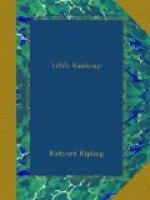Tietjens met me in the verandah with a bay like the boom of the bell of St. Paul’s, putting her paws on my shoulder to show she was glad to see me. Strickland had contrived to claw together a sort of meal which he called lunch, and immediately after it was finished went out about his business. I was left alone with Tietjens and my own affairs. The heat of the summer had broken up and turned to the warm damp of the rains. There was no motion in the heated air, but the rain fell like ramrods on the earth, and flung up a blue mist when it splashed back. The bamboos, and the custard-apples, the poinsettias, and the mango-trees in the garden stood still while the warm water lashed through them, and the frogs began to sing among the aloe hedges. A little before the light failed, and when the rain was at its worst, I sat in the back verandah and heard the water roar from the eaves, and scratched myself because I was covered with the thing called prickly-heat. Tietjens came out with me and put her head in my lap and was very sorrowful; so I gave her biscuits when tea was ready, and I took tea in the back verandah on account of the little coolness found there. The rooms of the house were dark behind me. I could smell Strickland’s saddlery and the oil on his guns, and I had no desire to sit among these things. My own servant came to me in the twilight, the muslin of his clothes clinging tightly to his drenched body, and told me that a gentleman had called and wished to see some one. Very much against my will, but only because of the darkness of the rooms, I went into the naked drawing-room, telling my man to bring the lights. There might or might not have been a caller waiting—–it seemed to me that I saw a figure by one of the windows—–but when the lights came there was nothing save the spikes of the rain without, and the smell of the drinking earth in my nostrils. I explained to my servant that he was no wiser than he ought to be, and went back to the verandah to talk to Tietjens. She had gone out into the wet, and I could hardly coax her back to me; even with biscuits with sugar tops. Strickland came home, dripping wet, just before dinner, and the first thing he said was.
‘Has any one called?’
I explained, with apologies, that my servant had summoned me into the drawing-room on a false alarm; or that some loafer had tried to call on Strickland, and thinking better of it had fled after giving his name. Strickiand ordered dinner, without comment, and since it was a real dinner with a white tablecloth attached, we sat down.
At nine o’clock Strickland wanted to go to bed, and I was tired too. Tietjens, who had been lying underneath the table, rose up, and swung into the least exposed verandah as soon as her master moved to his own room, which was next to the stately chamber set apart for Tietjens. If a mere wife had wished to sleep out of doors in that pelting rain it would not have mattered; but Tietjens was a dog, and therefore the better animal. I looked at Strickland, expecting to see him flay her with a whip. He smiled queerly, as a man would smile after telling some unpleasant domestic tragedy. ’She has done this ever since I moved in here,’ said he. ‘Let her go.’




